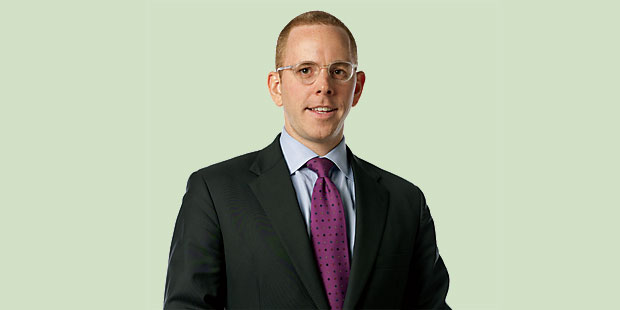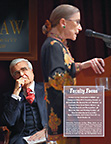Introducing Samuel Rascoff
Assistant Professor of Law
Printer Friendly VersionSamuel Rascoff is probably the only badge-carrying member of the New York City Police Department to leave that gritty world for NYU Law. The director of the NYPD’s 25-person intelligence analysis unit for the last two years, he had the heady responsibility of assessing the terrorist threat to the city, on call 24/7 whenever a threat emerged.
A dedicated public servant who previously worked for Ambassador Paul Bremer in setting up a transitional government in Iraq, Rascoff nonetheless sees joining NYU in June as a professor and faculty codirector at the Center on Law and Security as a logical move. “I firmly believe that shaping the American response to terrorism and creating a new architecture for counter-terrorism law is as much an act of public service as providing day-to-day assessments of terrorist threats,” says Rascoff.
Rascoff’s specialty is national security law, with an emphasis on counter-terrorism law—a burgeoning field that examines the sources, allocation and limits of government authority in protecting its citizens from terrorist attacks. While elements of national security law are relatively well-established in the law school curriculum, counter-terrorism law is still in its infancy. “We see ourselves as a leader in this new area of law. Having him join our faculty will be important as we move forward in that project,” says Dean Richard Revesz, who first glimpsed Rascoff’s scholarly abilities when the two collaborated on a law review article about risk regulation in the fall of 2001. “Even as a recent law school graduate, he had the ability, maturity and creativity of a seasoned academic.”
One of three siblings, Rascoff was raised in New Rochelle by his dad, Joel, a retired kidney specialist, and his mom, Barbara, a homemaker and perennial volunteer. An independent thinker, fluent in Arabic and Hebrew, he specialized in Islamic studies at Harvard. During college, he spent one summer working on the Pentagon’s Middle East desk, another at the State Department. After graduating in 1996, he received a Marshall Scholarship to do a second bachelor’s degree at Oxford University where he studied philosophy, politics and economics. Viewing the legal profession as “the priesthood of American public servants,” he attended Yale Law, graduating in 2001.
Outgoing and charismatic, with flaming red hair and a flair for dramatic outfits, Rascoff always stood out, recalls college and law school buddy Professor Jedediah Purdy of Duke University. “He does orange and pink well, and can carry off a bow tie,” he says.
In spring 2003, in between clerkships that included a year with Supreme Court Justice David H. Souter, Rascoff assisted Ambassador Bremer in Baghdad. Sleeping with 25 other people on cots covered with mosquito netting in the auxiliary kitchen of Saddam Hussein’s Republican Palace, he spent his days meeting with Iraqi officials and crisscrossing the country, talking with everyday Iraqis. “Sam was one of a tiny number of advisors who spoke Arabic and understood the political context,” says Professor Noah Feldman of Harvard Law, who was in Baghdad with him.
One day Feldman, Rascoff and a couple of other advisors drove without an escort into the Shiite areas south of Baghdad to talk to Iraqi citizens. “A couple of weeks later, Muhammad Baqir al-Hakim was killed by a car bomb in the same spot where we had just stood,” recalls Feldman. Rascoff describes his time there succinctly: “I had a front row seat when consequential decisions were being made.”
After Rascoff spent two years practicing litigation at Wachtell, Lipton, Rosen & Katz, NYPD Commissioner Raymond Kelly recruited him to set up the intelligence analysis unit. “We relied on Sam Rascoff’s superb legal training, combined with his extraordinary knowledge and command of geopolitics, to create an intelligence analyst program that has earned worldwide acclaim,” says Kelly. “He was personally responsible for recruiting top notch talent into the NYPD and did so with remarkable success.” Much of what Rascoff did there remains confidential, but he is willing to say that his job ran the gamut, from monitoring cyberspace chat rooms to participating in operational activities.
Rascoff is currently working on an article entitled “National Security Federalism,” in which he argues that state and local entities should play a larger role in setting national security policy, especially with regard to counter-terrorism. “National security so far has been relatively impervious to analysis through the lens of federalism,” he says. “But with counter-terrorism figuring prominently in the security agenda, we’ve come to appreciate that local government agencies, such as police departments, will inevitably shoulder more responsibility in combating today’s threats.”
Those who know Rascoff predict he will make an easy adjustment to academia. “A lot of young associates are fairly invisible. That never happened with Sam. Everybody knew who he was,” says Meyer Koplow, executive partner at Wachtell, Lipton, Rosen & Katz, adding, “He’s going to make a great professor because he’s just so approachable.”
Rascoff and his wife Lauren, 29, a resident in obstetrics and gynecology, live in the city. They both frequent the opera, and occasionally Rascoff finds time to play golf. Rascoff, a cantor in his synagogue, also attends daily services and enjoys having coffee afterward with two congregants, one in his 70s; the other in his 80s. “I always hit it off with the older set,” he says.
—

